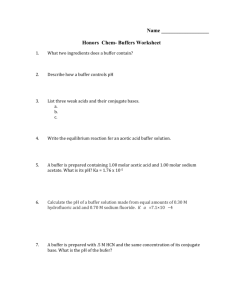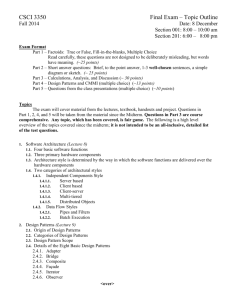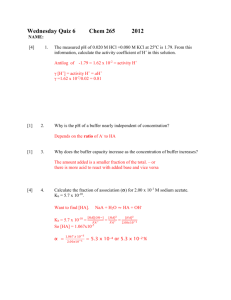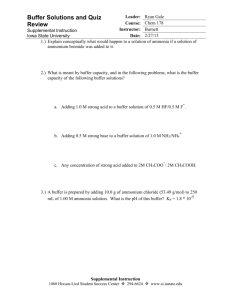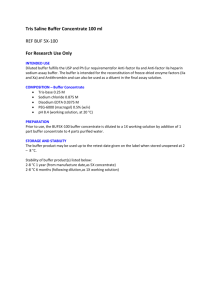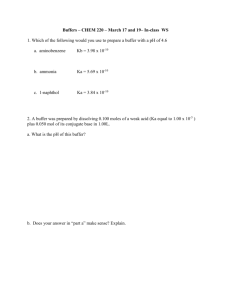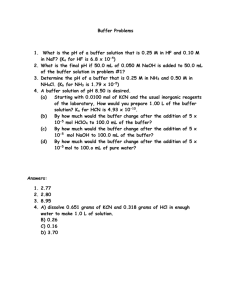Buffer Overflow Attack Explained with a C Program Example
advertisement
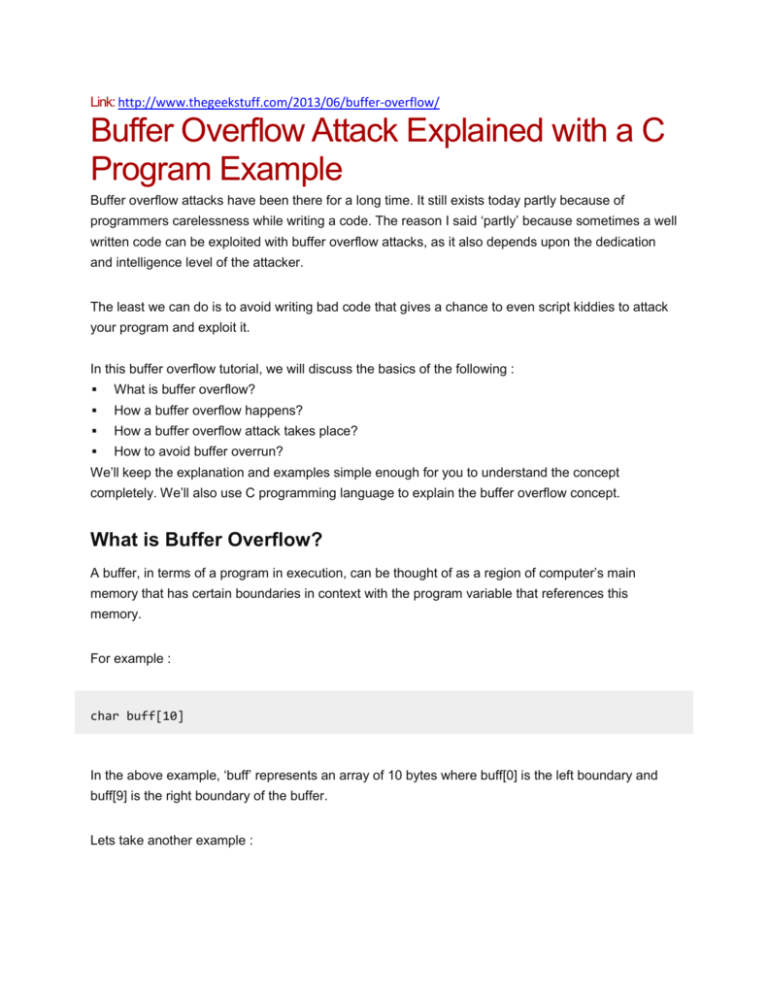
Link: http://www.thegeekstuff.com/2013/06/buffer-overflow/
Buffer Overflow Attack Explained with a C
Program Example
Buffer overflow attacks have been there for a long time. It still exists today partly because of
programmers carelessness while writing a code. The reason I said ‘partly’ because sometimes a well
written code can be exploited with buffer overflow attacks, as it also depends upon the dedication
and intelligence level of the attacker.
The least we can do is to avoid writing bad code that gives a chance to even script kiddies to attack
your program and exploit it.
In this buffer overflow tutorial, we will discuss the basics of the following :
What is buffer overflow?
How a buffer overflow happens?
How a buffer overflow attack takes place?
How to avoid buffer overrun?
We’ll keep the explanation and examples simple enough for you to understand the concept
completely. We’ll also use C programming language to explain the buffer overflow concept.
What is Buffer Overflow?
A buffer, in terms of a program in execution, can be thought of as a region of computer’s main
memory that has certain boundaries in context with the program variable that references this
memory.
For example :
char buff[10]
In the above example, ‘buff’ represents an array of 10 bytes where buff[0] is the left boundary and
buff[9] is the right boundary of the buffer.
Lets take another example :
int arr[10]
In the above example, ‘arr’ represents an array of 10 integers. Now assuming that the size of integer
is 4 bytes, the total buffer size of ‘arr’ is 10*4 = 40 bytes. Similar to the first example, arr[0] refers to
the left boundary while arr[9] refers to the right boundary.
By now it should be clear what a buffer means. Moving on lets understand when a buffer overflows.
A buffer is said to be overflown when the data (meant to be written into memory buffer) gets written
past the left or the right boundary of the buffer. This way the data gets written to a portion of memory
which does not belong to the program variable that references the buffer.
Here is an example :
char buff[10];
buff[10] = 'a';
In the above example, we declared an array of size 10 bytes. Please note that index 0 to index 9 can
used to refer these 10 bytes of buffer. But, in the next line, we index 10 was used to store the value
‘a’. This is the point where buffer overrun happens because data gets written beyond the right
boundary of the buffer.
It is also important for you to understand how GCC compilation process works to create a C
executable.
Why are buffer overflows harmful?
Some of us may think that though a buffer overflow is a bad programming practice but so is an
unused variable on stack, then why there is so much hullabaloo around it? What is the harm buffer
overrun can cause to the application?
Well, if in one line we have to summarize the answer to these questions then it would be :
Buffer overflows, if undetected, can cause your program to crash or produce unexpected results.
Lets understand a couple of scenarios which justify the answer mentioned above.
1. Consider a scenario where you have allocated 10 bytes on heap memory:
char *ptr
= (char*) malloc(10);
Now, if you try to do something like this :
ptr[10] = 'c';
Then this may lead to crash in most of the cases. The reason being, a pointer is not allowed to
access heap memory that does not belong to it.
2. Consider another scenario where you try to fill a buffer (on stack) beyond it’s capacity :
char buff[10] = {0};
strcpy(buff, "This String Will Overflow the Buffer");
As you can see that the strcpy() function will write the complete string in the array ‘buff’ but as the
size of ‘buff’ is less than the size of string so the data will get written past the right boundary of array
‘buff’. Now, depending on the compiler you are using, chances are high that this will get unnoticed
during compilation and would not crash during execution. The simple reason being that stack
memory belongs to program so any buffer overflow in this memory could get unnoticed.
So in these kind of scenarios, buffer over flow quietly corrupts the neighbouring memory and if the
corrupted memory is being used by the program then it can cause unexpected results.
You also need to understand how you can prevent stack smashing attacks with GCC.
Buffer Overflow Attacks
Until now we discussed about what buffer overflows can do to your programs. We learned how a
program could crash or give unexpected results due to buffer overflows. Horrifying isn’t it ? But, that
it is not the worst part.
It gets worse when an attacker comes to know about a buffer over flow in your program and he/she
exploits it. Confused? Consider this example :
#include <stdio.h>
#include <string.h>
int main(void)
{
char buff[15];
int pass = 0;
printf("\n Enter the password : \n");
gets(buff);
if(strcmp(buff, "thegeekstuff"))
{
printf ("\n Wrong Password \n");
}
else
{
printf ("\n Correct Password \n");
pass = 1;
}
if(pass)
{
/* Now Give root or admin rights to user*/
printf ("\n Root privileges given to the user \n");
}
return 0;
}
The program above simulates scenario where a program expects a password from user and if the
password is correct then it grants root privileges to the user.
Let’s the run the program with correct password ie ‘thegeekstuff’ :
$ ./bfrovrflw
Enter the password :
thegeekstuff
Correct Password
Root privileges given to the user
This works as expected. The passwords match and root privileges are given.
But do you know that there is a possibility of buffer overflow in this program. The gets() function does
not check the array bounds and can even write string of length greater than the size of the buffer to
which the string is written. Now, can you even imagine what can an attacker do with this kind of a
loophole?
Here is an example :
$ ./bfrovrflw
Enter the password :
hhhhhhhhhhhhhhhhhhhh
Wrong Password
Root privileges given to the user
In the above example, even after entering a wrong password, the program worked as if you gave the
correct password.
There is a logic behind the output above. What attacker did was, he/she supplied an input of length
greater than what buffer can hold and at a particular length of input the buffer overflow so took place
that it overwrote the memory of integer ‘pass’. So despite of a wrong password, the value of ‘pass’
became non zero and hence root privileges were granted to an attacker.
There are several other advanced techniques (like code injection and execution) through which
buffer over flow attacks can be done but it is always important to first know about the basics of
buffer, it’s overflow and why it is harmful.
To avoid buffer overflow attacks, the general advice that is given to programmers is to follow good
programming practices. For example:
Make sure that the memory auditing is done properly in the program using utilities likevalgrind
memcheck
Use fgets() instead of gets().
Use strncmp() instead of strcmp(), strncpy() instead of strcpy() and so on.

